Stephen Kenny and Ireland expected better than one point from two games. The draw in Bulgaria wasn't great and losing the first game at home to Finland is even worse. But Kenny's Ireland are going in the right direction despite results.
"We probably had 4-5 chances today. When you get them, you've got to take them. It's as simple as that."
That was the most telling quote from Stephen Kenny's post-match comments on Sunday. The Republic of Ireland manager is already facing criticism from those who never wanted him in the job in the first place. It's an easy thing to do. Ireland didn't get the results they should have gotten and now they have to dig themselves out of a hole early in the Nations League.
Of course, most of the criticism conveniently ignores that results under the previous regimes weren't good either. It mostly ignores that half of this squad is nowhere near matchday fitness and that Kenny only had two training sessions with them before his first game.
Ireland can still lump the ball in the box at the end of games when they need to. We haven't lost that identity from our attack.
But whereas that was previously our only way of scoring goals, now it's the last resort. Ireland did more in these two games with the ball than they did in the entirety of Mick McCarthy's time in charge. The football we played led to more chances and will continue to lead to more chances. The problem wasn't with Stephen Kenny's approach or his overarching philosophy, Ireland's problem was they didn't take their opportunities.
A consistent trend over these first two games was how much higher upfield Ireland are defending. In our collective past life we dropped to the edge of our own box as soon as possession was lost. When we retained possession there were more bodies and more distance between us and scoring. That's no longer the case.
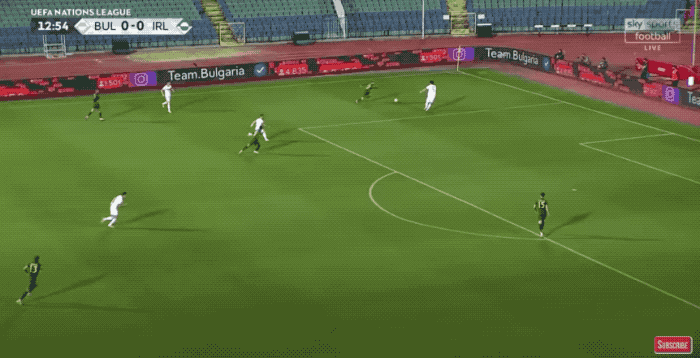
This was one of Ireland's best chances against Bulgaria. Aaron Connolly nips in to win the ball off the Bulgarian defender in the final third. Connolly had an early option to pass the ball across but he took a touch instead. Had he played the ball first time, Callum O'Dowda could have had a first-time shot at goal. Instead, Connolly flashed the ball passed the far post.
It was a costly miss.
That was 12 minutes into a game away from home. Bulgaria aren't one of Europe's elite teams but Ireland of the past would have played scared against them away from home. Kenny's team didn't.
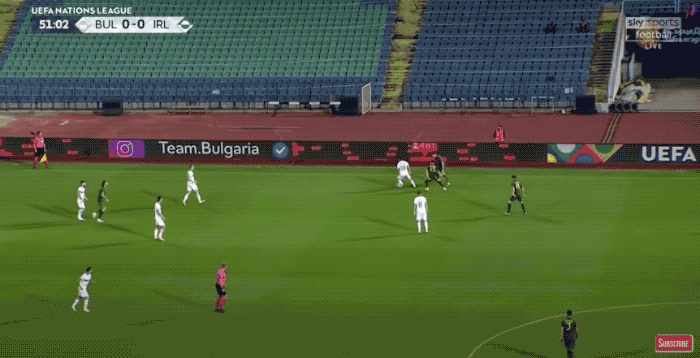
On this play, Bulgaria win the ball in midfield after a throw-in. Instead of dropping off, Ireland's midfield pressure the ball, which leads to a defender hurrying his clearance downfield. John Egan is on the halfway line to win the ball rather than dropping back toward his own box. His strong header falls to Adam Idah who plays in Connolly. Idah's touch is slightly short, forcing Connolly to come back to the ball.
A better touch here from Idah and Connolly is one-on-one with the keeper.
These are young players who are still developing at this level. Considering Idah's lack of senior experience at club level, his performances upfront alone were very impressive. He didn't get much off the Bulgaria center backs initially but continued to fight throughout the game and laid off some impressive touches. Connolly put himself in a position to potentially score, something rarely done by James McClean when he was an automatic choice on the left wing.
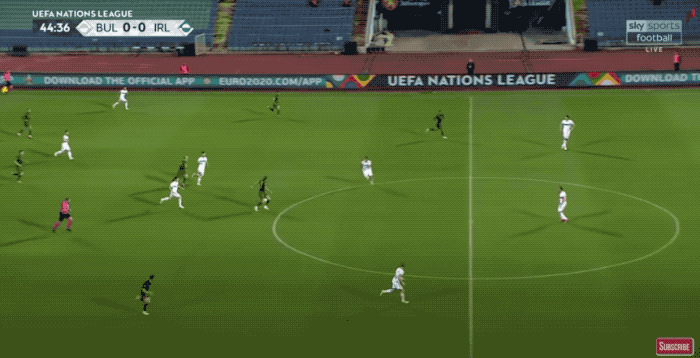
Ireland's best chance in Bulgaria came when O'Dowda got into the box from his right-wing spot. Enda Stevens just put the ball onto his wrong foot when he played the ball across. O'Dowda found the space intelligently and could have pulled the trigger if it was on his left foot. This is the type of pass from Stevens that gets better with time. A combination of rust and not playing together often enough causes this imprecision.
O'Dowda had an excellent first half in Bulgaria then wilted in the second half. A fair criticism of Ireland is that his wingers didn't play to their potential.
Neither Connolly nor O'Dowda came off their wings enough. There was a severe lack of movement off the ball in the Finland game from the whole team. Maybe it's tiredness from not being fully fit. It was the biggest contribution to making the first half of that game look like a preseason friendly.
Connolly played with arrogance on the wing at under-21 level. Ireland need him to play that way at senior level. He shouldn't settle for playing the ball back as often as he did. O'Dowda should be drifting inside more often. That will create space for Doherty outside, offer another link-up option inside and get support closer to Idah.
Both of the goals that Ireland conceded were a result of a structural breakdown in midfield.
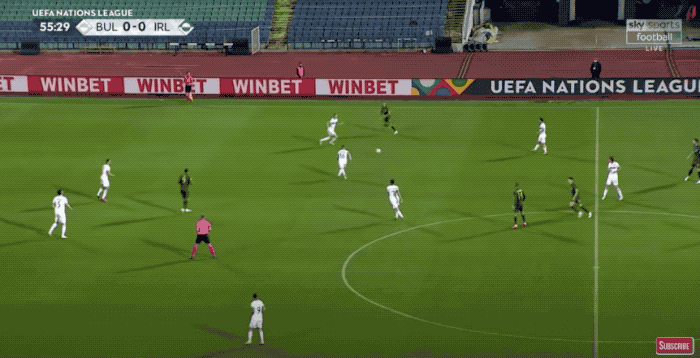
In Bulgaria, Conor Hourihane gave the ball away then chased it across the field to try and win it back. Hourihane, Jeff Hendrick and James McCarthy were all on the right side of the field while a Bulgarian midfielder was left in wide-open space inside. This gave him the opportunity to play in the striker for the goal.
That's a mistake born out of a lack of understanding of the new system they're playing in.
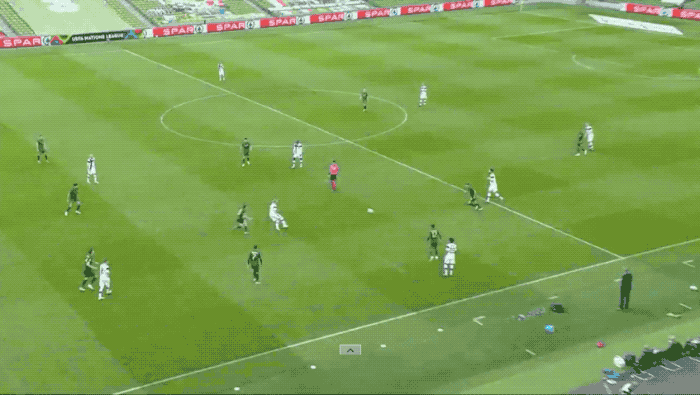
One big concern for Ireland ahead of the Slovakia game is the poor play from both central sitting midfielders. James McCarthy struggled on the ball in Bulgaria while Harry Arter was too aggressive against Finland. Arter dove in regularly and for the Finland goal he took himself out of position by trying to win the ball instead of staying goal side. It didn't make sense for him to jump forward and break the team's shape in this scenario.
There was no real opportunity to win the ball and the attacker carried no threat with it in that area of the field.
Finland had other opportunities to score. Darren Randolph stopped Teemu Pukki one-on-one during the first half and made an outstanding fingertip save in the second half. But Ireland had far more opportunities and generally had the better of the play. The players just weren't clinical.
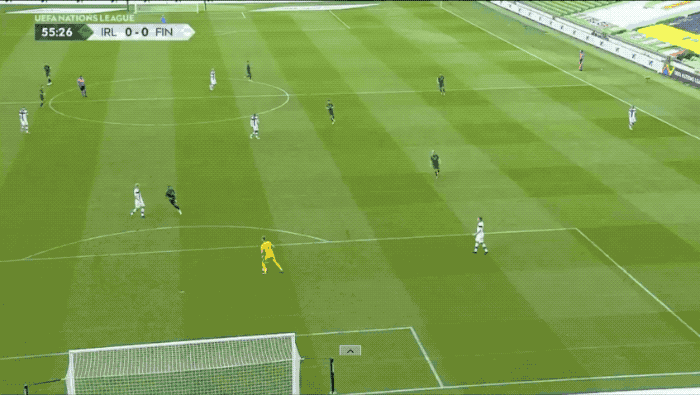
The first half was a lifeless game with both sides too comfortable passing the ball in safe areas of the field. There was definitely a greater intensity in the second half and Ireland almost profited immediately. Finland repeatedly tried to play the ball out from the back. On this occasion, Robbie Brady smartly nips in to take the ball away in the middle of the field.
His pass finds Idah who uses a smart first touch to shift the ball to Connolly. The winger drops his shoulder and just pushes the ball slightly too far wide to get a good strike on goal.
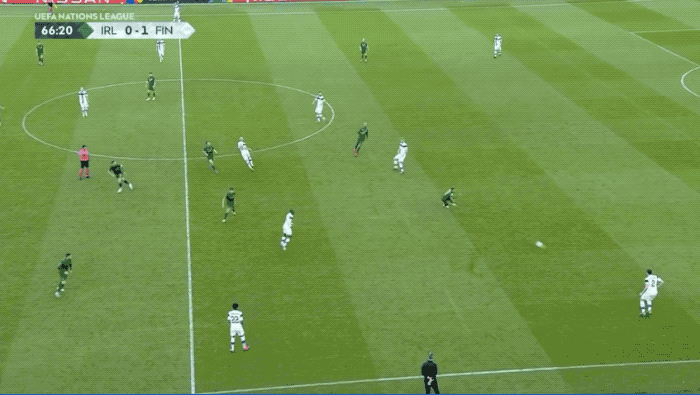
Matt Doherty had a bad game in Bulgaria. He looked uncomfortable. Speculation that he struggled because he was playing right-back rather than right wing-back is fair, but it's more likely that he came straight off of his holidays into Irish training camp. Doherty looked slow and lacked intensity in Bulgaria. He carried that lax nature into the first half of the Finland game but was outstanding in the second half.
He wins the ball in the Finland half after Callum Robinson's high press to set up this chance for Connolly. This was Ireland's best chance against Finland, Connolly's whiff should have been his first goal for Ireland.
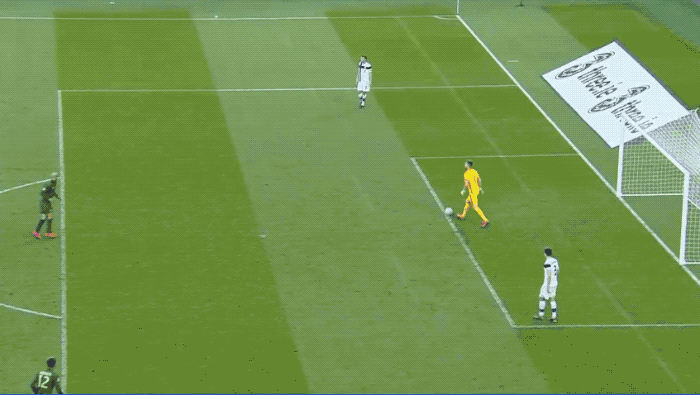
Connolly's lack of poise in front of goal is more forgivable because of his youth. The goal kick immediately after his whiff saw Callum Robinson press to win the ball in scoring position. David McGoldrick took too many touches without moving. He had to either strike the ball with his right foot after his first touch with his left or push it forward so he couldn't be blocked.
McGoldrick isn't a natural goalscorer for club or country but this was a big miss. This play was notable for both wingers coming infield at the right time. Robinson had a greater impact than O'Dowda pressing because he has a greater feel for the position at this stage of their respective careers.
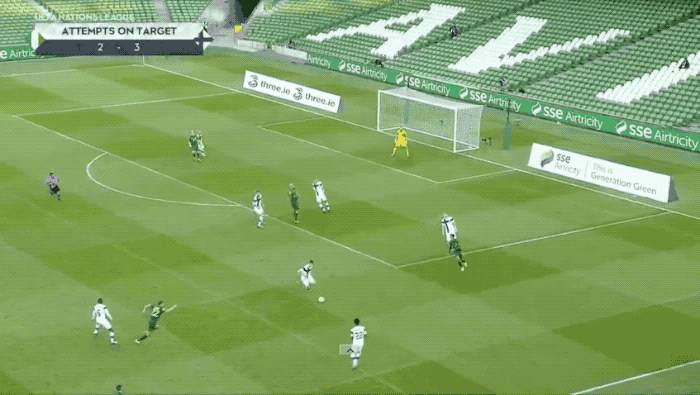
Doherty set up another chance by winning the ball high upfield again. This time he played in Robinson who needed to place the ball far better to test the keeper. The keeper made himself big but Robinson's strike made it easy for him to make the save.
After playing Stephen Kenny's way for the majority of the game, Ireland's threat of Shane Duffy at set pieces still existed at the end.
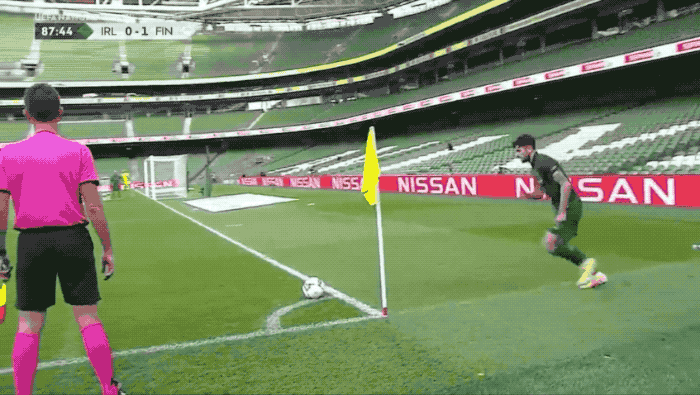
Again it was Robbie Brady's delivery from the corner. This was an easier opportunity than the one he scored in Bulgaria. Duffy's movement was excellent. He should have scored again.
Nobody sane would sell that all is well with Ireland after those first two games. But the results don't fully reflect the performances. As a manager you have far more control over the process and performance than you do the end result. If the players aren't capitalizing on opportunities or executing their individual instructions, then there's only so much you can achieve.
Ireland are a team in transition. They're incorporating young players and trying to maximize the impact of established players. There are correctable problems that need to be addressed and there's plenty of time to address them. This is a long-term project and, as George Hamilton noted, Ireland's most successful spells began with disappointing results.
Patience is a virtue and in sports, it's a necessary part of the process.
Download the brand new OffTheBall App in the Play Store & App Store right now! We've got you covered!
Subscribe to OffTheBall's YouTube channel for more videos, like us on Facebook or follow us on Twitter for the latest sporting news and content.








